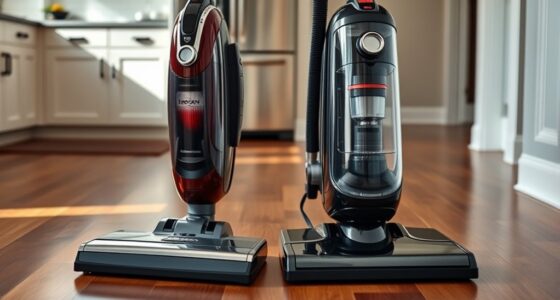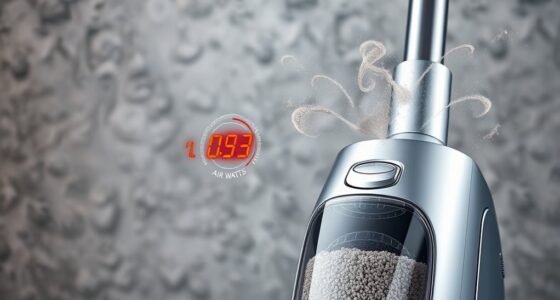You can easily whip up natural cleaning recipes at home using simple ingredients like vinegar, baking soda, and essential oils. For an all-purpose cleaner, mix 1/2 cup vinegar with 4 cups warm water. In the kitchen, create a paste of baking soda and salt to tackle tough grime. Don’t forget to label your cleaners and keep them out of reach of kids and pets. Discover even more creative solutions and tips for a sparkling clean home.
Key Takeaways
- Combine 1/2 cup white vinegar with 4 cups warm water for an effective all-purpose cleaner.
- Create a paste using 1/4 cup baking soda, 1 teaspoon salt, and water to clean ovens.
- Mix ½ cup Borax, ½ cup washing soda, and ½ cup Dawn dish soap for homemade laundry detergent.
- Use 1 tablespoon castile soap, 15 drops lemon essential oil, and 2 cups water for a natural dusting spray.
- Sprinkle 2 cups Borax and 1 cup baking soda on carpets as an odor neutralizer before vacuuming.
Homemade All-Purpose Cleaner

If you want a simple and effective way to clean your home, making a homemade all-purpose cleaner is a great choice. Combine 1/2 cup of white vinegar with 4 cups of warm water for an effective cleaning spray. To boost its antibacterial properties and add a pleasant scent, include 10 drops of essential oils like lemon or tea tree. This cleaner is safe for surfaces such as countertops, sinks, and tile, but avoid using it on natural stone like marble or granite. Incorporating sustainable practices into your cleaning routine can also enhance your commitment to eco-friendly living. In times of crisis, having essential survival gear like this homemade cleaner can help maintain hygiene and a healthy environment. Additionally, using DIY cleaning solutions can contribute to a healthier home environment by reducing exposure to harsh chemicals. Store your mixture in a glass spray bottle to maintain its effectiveness and minimize plastic waste. Plus, this cost-effective alternative to commercial products helps you create a healthier home environment by using natural ingredients. Additionally, using natural ingredients can make your cleaning routine more eco-friendly and reduce exposure to harsh chemicals.
Kitchen Cleaning Solutions
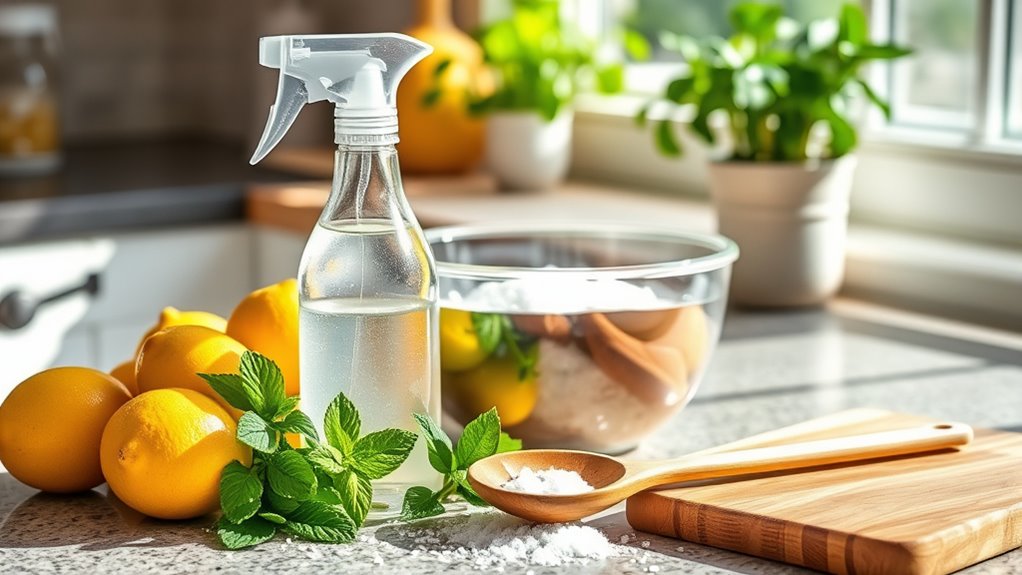
When it comes to keeping your kitchen spotless, you’ll want effective solutions at your fingertips. From an all-purpose cleaner to tackle everyday messes to natural methods for cleaning your oven and dishwasher, you’ve got plenty of options. Incorporating essential oils for cleaning can enhance the effectiveness of your homemade solutions while adding a pleasant scent. Additionally, using eucalyptus oil in your cleaning solutions can provide powerful antimicrobial benefits, helping to purify surfaces in your kitchen. Furthermore, using natural compost can help in reducing waste and create an eco-friendly cleaning routine. A clean kitchen can also promote healthier eating habits by encouraging you to prepare more meals at home, emphasizing the importance of whole foods over processed options. Let’s explore these simple yet powerful kitchen cleaning solutions that make your life easier.
All-Purpose Cleaner Recipe
Creating a simple and effective all-purpose cleaner for your kitchen is easier than you might think.
With just a few ingredients, you can whip up a homemade cleaner that’s both safe and effective. Here’s how to do it:
- Mix 1/2 cup of white vinegar with 4 cups of warm water.
- Add 10 drops of essential oils for a pleasant scent and antibacterial properties.
- Infuse vinegar with citrus rinds for 2-4 weeks for enhanced cleaning power. Cycling adventures can also inspire you to maintain a clean and organized kitchen space.
- Store your mixture in a glass spray bottle to maintain effectiveness.
- Use distilled water for longer freshness. Additionally, using eco-friendly materials in your cleaning solutions can contribute to a healthier environment.
This non-toxic all-purpose cleaner is ideal for homes with pets and children, making your kitchen a cleaner, healthier space with natural cleaning products. Additionally, considering the financial considerations for elderly care can help you allocate funds for purchasing natural cleaning supplies that promote a safe environment. By using non-toxic solutions, you can ensure that your cleaning routine supports the well-being of your family and loved ones.
Oven Cleaning Solutions
While keeping your oven clean might seem challenging, using natural solutions can make the task simple and effective.
One easy homemade oven cleaner is a paste made from 1/4 cup of baking soda, 1 teaspoon of salt, and enough water to spread it on the surfaces. Leave it overnight for effective grime removal. Additionally, using a natural cleaner like this can help maintain a safe cooking environment, similar to how freshly squeezed juice retains nutrients. Regular cleaning can also prevent the buildup of airborne pollutants that may affect the air quality in your kitchen. Using appropriate cleaners for specific surfaces can enhance the effectiveness of your cleaning routine.
You can enhance this by mixing 1/2 cup of baking soda with 2-3 tablespoons of water and spraying white vinegar over it for foaming action that lifts tough stains.
For basic maintenance, a non-toxic option is equal parts water and white vinegar in a spray bottle.
Don’t forget to rinse and dry surfaces thoroughly to guarantee food safety when using these natural cleaners. Additionally, using natural cleaning methods can complement your kitchen’s Italian cuisine preparation, ensuring a clean environment for cooking delicious meals like mushroom risotto.
Dishwasher Detergent Alternatives
Here are some simple recipes to try:
- Combine 1 cup of salt, 2 cups of baking soda, 2 cups of Borax, and 1 cup of Lemi-Shine, using 2 tablespoons per load.
- Mix 1 cup of baking soda, 1 cup of washing soda, and 1 cup of white vinegar for a natural cleaning solution. Wood-burning stoves are also known for their efficient heating, making them a great addition to homes. Additionally, using dilution guidelines can help ensure that any essential oils added remain safe for household use. Incorporating natural cleaning solutions can enhance mental well-being by reducing exposure to toxins in your living environment.
- Use 2 tablespoons of liquid dish soap mixed with 2 tablespoons of vinegar in the dishwasher.
- Add a few drops of essential oils for antibacterial properties and a fresh scent.
- Store your homemade dishwasher detergent in a glass container to keep it effective and moisture-free. Regularly using these homemade alternatives can contribute to a healthier lifestyle by minimizing exposure to harsh chemicals commonly found in commercial products.
Effective Bathroom Cleaners
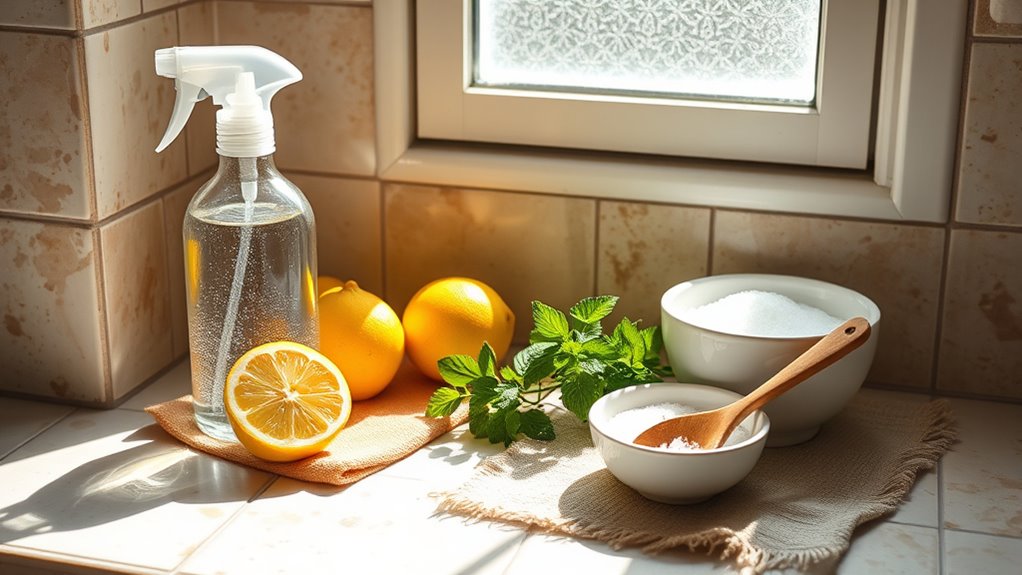
When it comes to keeping your bathroom sparkling clean, effective natural cleaners can make all the difference.
For a powerful toilet bowl cleaner, mix 1 cup of baking soda with 1/4 cup of citric acid and 1/2 cup of vinegar. This combination works wonders for deep cleaning and stain removal, which is essential for maintaining fixtures’ condition in your bathroom.
To tackle soap scum and mildew, create a paste from baking soda and water, apply it to the affected areas, and scrub after a few minutes.
Create a baking soda paste to combat soap scum and mildew, apply it, and scrub for a sparkling clean finish.
For mirrors, blend 1/4 cup of white vinegar, 1/4 cup of isopropyl alcohol, and 2 cups of water for a streak-free shine.
Finally, freshen the air with 12-15 drops of essential oils mixed with 1/2 cup of white vinegar and 1 1/2 cups of water. Keeping the air clean can be enhanced by optimal usage timing of air purifiers, especially during cleaning sessions.
Laundry Room Essentials

Keeping your home clean doesn’t stop at the bathroom; the laundry room deserves just as much attention. You can easily create effective DIY cleaners that are eco-friendly and budget-friendly.
Here are some essentials you’ll want to try:
- Homemade laundry detergent: Mix ½ cup Borax, ½ cup washing soda, and ½ cup Dawn dish soap with 4 cups of hot water.
- Tough stain remover: Combine 2/3 cup Dawn dish detergent, 2/3 cup ammonia, and 6 tablespoons baking soda in 2 cups warm water.
- Liquid fabric softener: Blend 5 ½ cups water, 15 ounces hair conditioner, and 2.5 cups cup white vinegar.
- Natural laundry freshener: Add ½ cup distilled white vinegar during the rinse cycle.
- DIY dryer sheets: Soak old t-shirt squares in a fabric softener solution.
Living Area Cleaning Recipes

While maintaining a clean living area might seem challenging, using natural cleaning recipes can make the task simpler and more enjoyable.
For an effective dusting spray, mix 1 tablespoon of castile soap, 15 drops of lemon essential oil, and 2 cups of water. This all-purpose cleaner not only cleans but also leaves an invigorating scent.
For wood surfaces, combine ¾ cup olive oil and ¼ cup white vinegar, adding essential oils if you like.
To tackle carpet stains, use a solution of 1 tablespoon Dawn dish soap, 1 tablespoon vinegar, and 2 cups warm water.
For odors, sprinkle a mix of 2 cups Borax and 1 cup baking soda on carpets before vacuuming.
Happy cleaning your home!
Natural Fabric Softener and Dryer Sheets
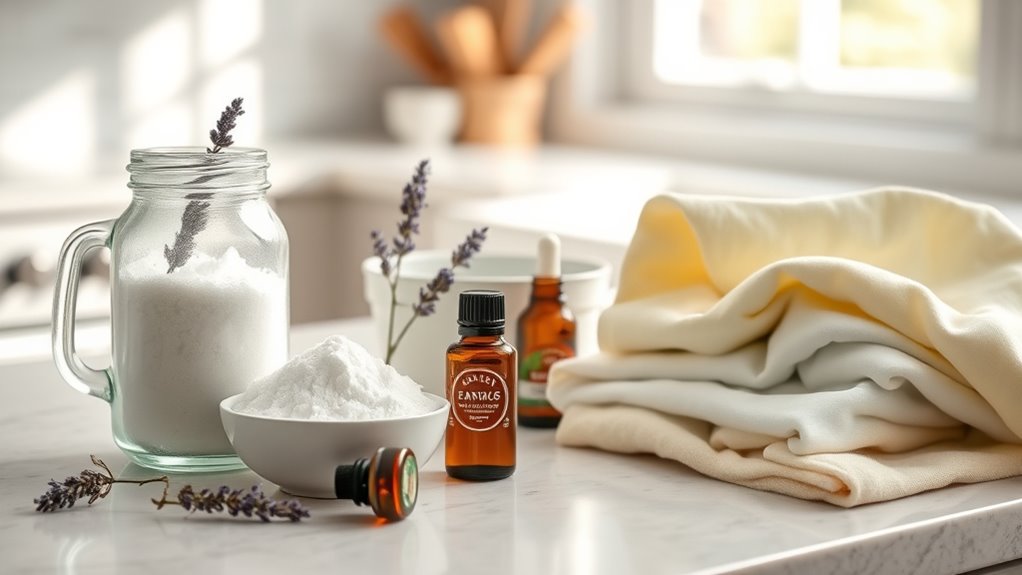
You can easily create your own fabric softener with just a few simple ingredients, making laundry day more enjoyable.
Plus, DIY dryer sheets using old t-shirts not only save you money but also help you avoid harsh chemicals.
Let’s explore the benefits of these natural alternatives and how they can enhance your laundry routine.
Homemade Fabric Softener Recipe
Creating a homemade fabric softener is a simple and effective way to keep your laundry soft and fresh without relying on commercial products. To make your own, combine the following ingredients:
- 5 ½ cups of water
- 15 ounces of hair conditioner
- 2.5 cups of white vinegar
- Optional essential oils (like lavender or lemon)
- ¼ cup per wash load for softening
This eco-friendly solution not only meets your cleaning needs but also helps eliminate static cling and odors.
For added convenience, you can create DIY dryer sheets by soaking squares of old t-shirts in the homemade fabric softener.
Enjoy the pleasant scent while knowing you’re reducing reliance on harsh chemicals and plastic packaging!
Eco-Friendly Dryer Sheet Alternatives
If you’re looking for a way to soften your laundry without the harsh chemicals found in commercial dryer sheets, eco-friendly alternatives are a great solution.
You can easily make homemade dryer sheets by cutting old t-shirts into squares, soaking them in a natural fabric softener made from 5 ½ cups of water, 15 oz of hair conditioner, and 2.5 cups of white vinegar. This method avoids chemical additives while providing a gentle softening effect.
For a pleasant scent, add essential oils to your fabric softener or homemade dryer sheets. Not only do these cost-effective alternatives reduce waste by repurposing old clothing, but they also create a healthier home environment, especially for sensitive skin.
Benefits of Natural Softening
While many people rely on commercial fabric softeners for laundry, opting for natural alternatives offers numerous benefits that enhance both your garments and the environment.
By using homemade softeners, you can enjoy:
- Reduced static cling without harsh chemicals
- Softer fabrics that last longer
- Fresh scents from essential oils
- Cleaner laundry by breaking down detergent residues with white vinegar
- Eco-friendly alternatives that minimize waste
Homemade fabric softeners, like a blend of water, hair conditioner, and vinegar, provide a simple and effective solution.
Plus, DIY dryer sheets made from old t-shirts soaked in this natural softener allow you to avoid synthetic fragrances while being kind to your clothes and the planet.
Embrace natural cleaning for a healthier laundry experience!
Stain Removal Techniques

Stains can be a real headache, but with the right techniques, you can tackle them effectively.
For tough stains, try a homemade stain remover by mixing 2/3 cup Dawn dish detergent, 2/3 cup ammonia, and 6 tablespoons baking soda in 2 cups of warm water. Spray it on the stain, let it rest, and then rinse.
For water stains, sprinkle baking soda to absorb moisture before applying a solution of washing soda and diluted white vinegar. Let it sit for 20 minutes before washing.
For carpet stains, use a mixture of 1 tablespoon Dawn, 1 tablespoon vinegar, and 2 cups warm water. Blot the area until the stain is removed, and don’t forget to add a few drops of essential oils for a fresh scent!
Key Ingredients for Natural Cleaning
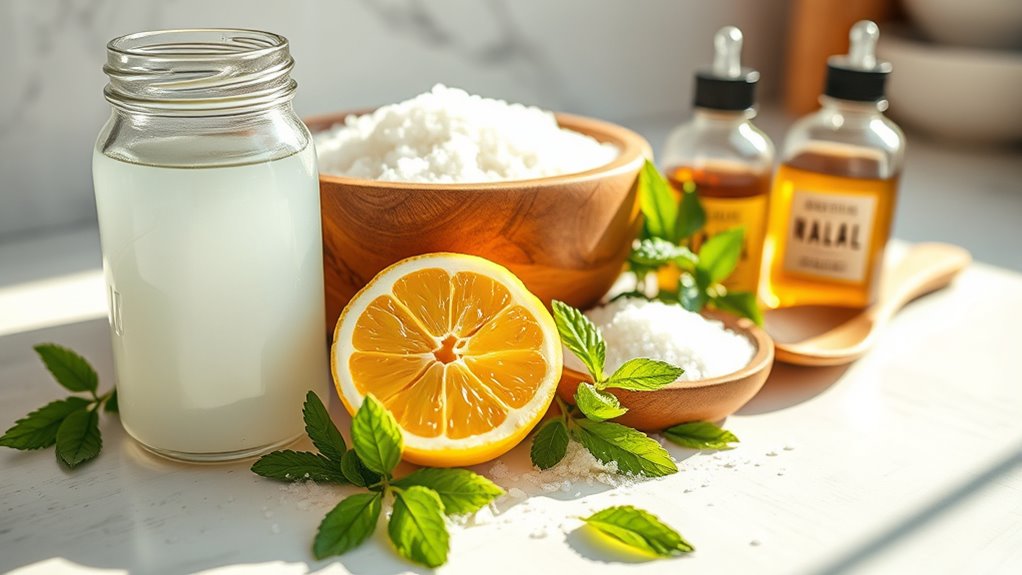
When it comes to natural cleaning, the right ingredients make all the difference. Incorporating these key elements into your all-purpose cleaner will boost its effectiveness while keeping your home safe from harsh chemicals:
- Vinegar: A versatile agent that kills germs and deodorizes surfaces.
- Baking Soda: A mild abrasive that removes tough stains and absorbs odors.
- Lemon Juice: Cuts through grease and lightens stains with its antibacterial properties.
- Essential Oils: Add pleasant scents while providing natural antibacterial and antifungal benefits.
- Castile Soap: A gentle, plant-based detergent for cleaning dishes and surfaces.
Using these household products not only enhances your natural cleaning routine but also guarantees a healthier living environment.
Safety Precautions for Homemade Cleaners
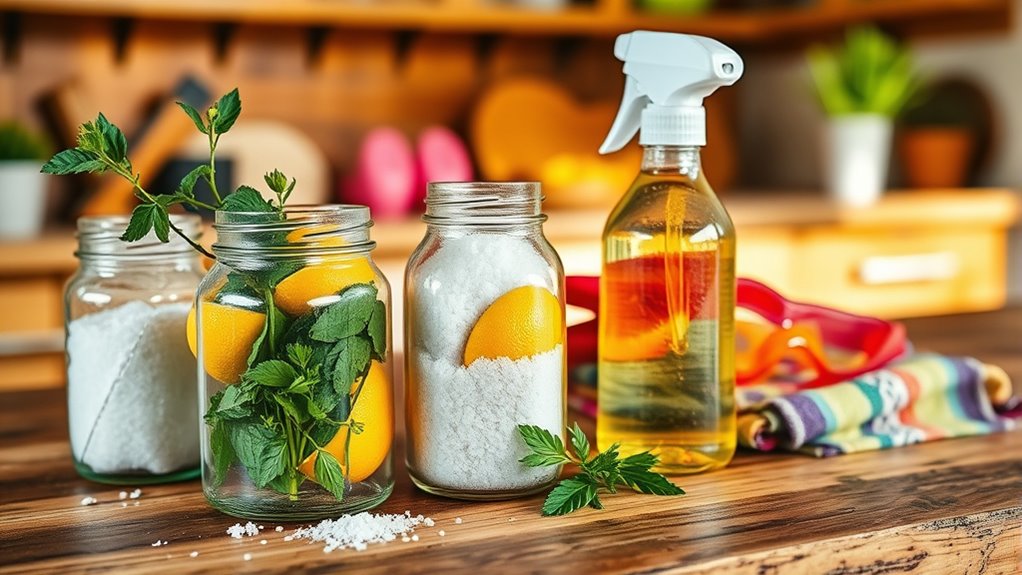
Using homemade cleaners can be a safe and effective way to maintain a clean home, but you should always prioritize safety precautions.
Start by labeling all your cleaners clearly to prevent accidental misuse, and keep them out of reach of children and pets.
When working with strong ingredients like white vinegar or essential oils, wear gloves and protective eyewear to shield your skin and eyes from irritation.
Guarantee good ventilation while using these products to avoid respiratory discomfort.
Always remember not to mix ammonia-based cleaners with bleach, as this creates toxic fumes.
For storage, use glass containers instead of plastic, as they’re less likely to leach chemicals, and store them in a cool, dark place for longevity.
Tips for Effective Cleaning With Natural Products

To achieve the best results with natural cleaning products, it’s important to apply a few effective strategies. Here are some tips to enhance your cleaning experience:
- Always test homemade cleaning solutions on a small area first.
- Use distilled water in your recipes to prevent mold growth.
- Allow solutions to sit on surfaces for a few minutes to break down dirt.
- Incorporate essential oils for fragrance and their antimicrobial properties.
- Avoid using white vinegar on natural stone surfaces like granite or marble.
These strategies guarantee your natural cleaners are effective at cleaning without damaging surfaces.
Frequently Asked Questions
What Is the Best All Natural Homemade Cleaner?
The best all-natural homemade cleaner you can make combines equal parts white vinegar and water.
This mix effectively disinfects and deodorizes surfaces without harmful chemicals.
If you want to enhance its power, add 10-20 drops of essential oils like lemon or tea tree for a pleasant scent and extra antibacterial benefits.
Just remember to store it in a glass spray bottle to extend its shelf life, and avoid using it on natural stone surfaces.
What Is the Best Homemade All-Purpose Cleaner Recipe?
When it comes to cleaning, think of your home as a canvas that deserves the best brush.
The best homemade all-purpose cleaner combines 1/2 cup of white vinegar with 4 cups of warm water. For a touch of fragrance, add 10 drops of essential oil.
This blend works wonders on various surfaces, but steer clear of natural stone to avoid damage.
Store it in a glass spray bottle to keep it fresh and eco-friendly!
Which 2 Ingredients Make Great DIY Household Cleaner?
If you’re looking for a great DIY household cleaner, vinegar and baking soda are your best bets.
When combined, they create a powerful reaction that tackles tough stains and odors. Vinegar acts as a disinfectant, while baking soda’s mild abrasiveness makes it perfect for scrubbing surfaces.
Together, they form an effective, cost-efficient solution that’s safe for your home and the environment.
Give it a try, and you’ll be impressed with the results!
What Are the Natural Ingredients for Cleaning?
When you think about natural ingredients for cleaning, consider vinegar, baking soda, lemon juice, essential oils, and hydrogen peroxide.
Vinegar disinfects and deodorizes, while baking soda scours and neutralizes odors.
Lemon juice cuts through grease and adds antibacterial properties.
Essential oils, like tea tree or lavender, enhance your cleaning solutions with pleasant scents.
Finally, hydrogen peroxide works as a natural bleaching agent, perfect for sanitizing surfaces and tackling tough stains.
Conclusion
Now that you’ve discovered these natural cleaning recipes, imagine the transformation your home can undergo. Picture sparkling surfaces and fresh scents without harsh chemicals. But wait—before you plunge into it, remember the key ingredients and safety precautions we discussed. With the right approach, you’ll not only clean effectively but also create a healthier environment for you and your loved ones. Are you ready to embrace a cleaner, greener home? The choice is yours, and the results might just surprise you!



